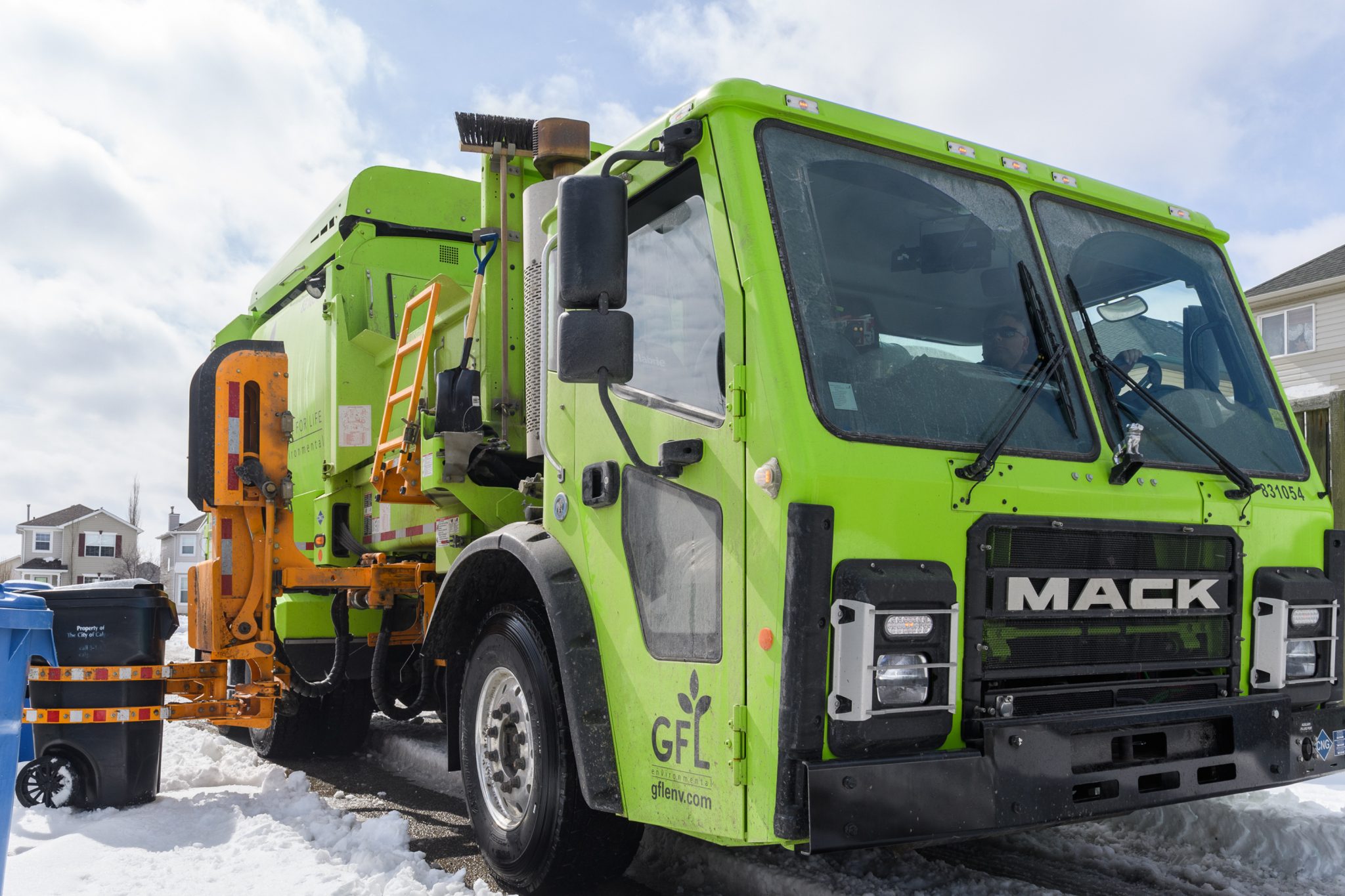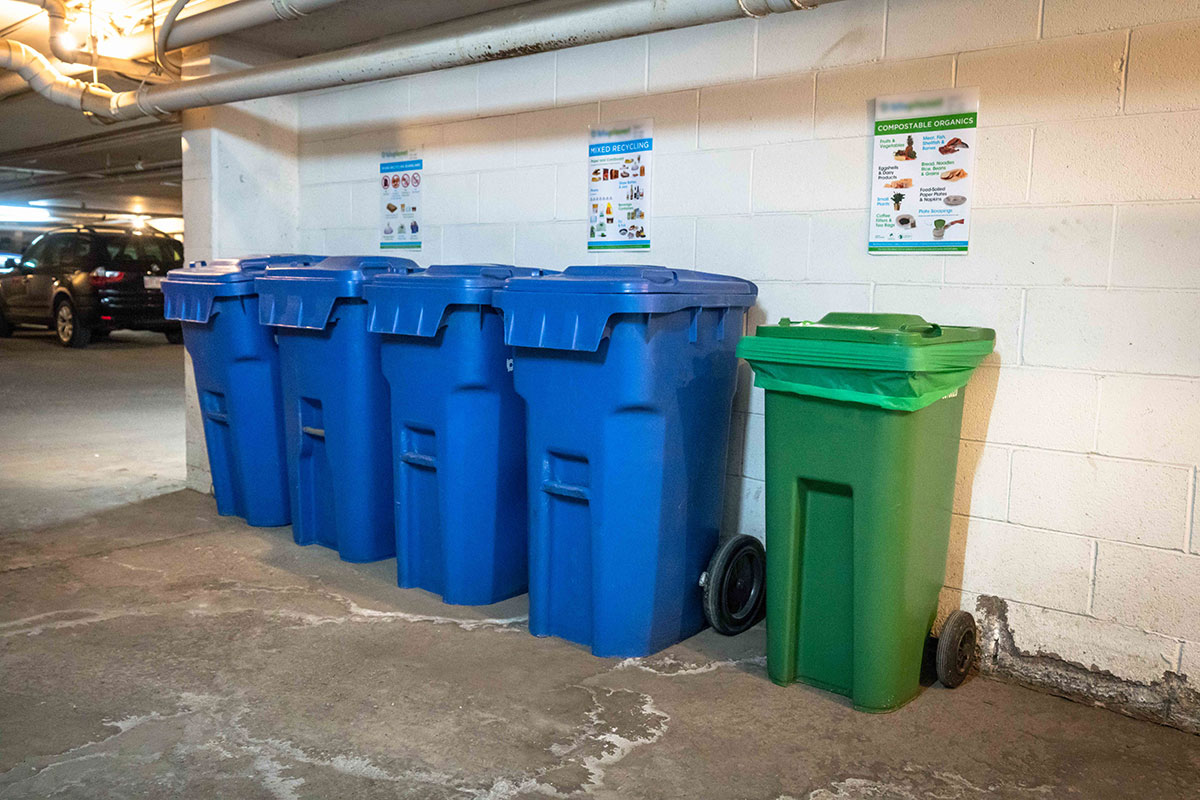Choosing bins for your complex
Your bins are considered adequate when all waste fits inside the bin(s) between collection pickups while keeping recycling, compost and garbage separated.
Setting up your bins the right way, whether it is in a garbage room or outdoor storage area, can reduce mess, make it easier for residents to use and might even save your building money and space.
There are many different factors to consider when providing adequate waste bins for your multi-family complex.
Work with your waste hauler to find the combination of number of bins, size/type of bins and pickup frequency to meet your property’s needs.
Size and type of bins
There are many different types of waste containers available. The most common types for multi-family complexes are:
-
Carts
Plastic bins with wheels that make them easy to move as needed. Good for low volume waste streams and smaller spaces.
-
Dumpster (front end load – FEL)
For larger complexes with larger volume waste levels. Extra accessories like lids, locks and wheels can be added.
Adequate bins
Here are some examples of what adequate bins look like in a multi-family complex.
A complex with 50 units usually needs weekly service of:
- two x 6/8 yard garbage dumpsters
- one or two x 6/8 yard recycling dumpster
- two x 240 L food waste carts
Larger complexes may make use of compactors or have the bins picked up multiple times a week.
Inadequate bins
Here are some examples of what inadequate bins look like in a multi-family complex.
As you can see they are often overfilled resulting in messy garbage rooms and enclosures.
Providing enough of the right bins will allow your residents to properly dispose of their waste.
Number of bins
While you are required to provide recycling, composting and garbage, this does not mean that you will end up with an equal number of bins for each service.
As a best practice, make recycling and composting as convenient as garbage.
- Recycling often makes up a larger portion of a resident’s waste and may require multiple bins to fit all recyclables.
- In a multi-family complex, composting is often only food scraps so smaller compost bins are generally adequate.
- Keep bins together in the same area. If bins are separated, residents are apt to use the closest bin even if it’s not the right one. This helps residents properly sort materials and reduce the wrong items going into the wrong bins.
Frequency of collection
You can setup your waste service to be picked up more often if needed. This is helpful for multi-family complexes that have limited space for waste pickup.
Common collection frequencies include:
- daily
- twice per week
- weekly
- every other week
- monthly or on call as needed.
Ask for feedback from your waste hauler
Feedback might include updates on contamination (wrong items in the bins), damage to bins, how full bins are, and reasons for missed collection. Pass along feedback to residents to further support proper sorting in your building.
Your hauler may also offer additional resource materials that can be given to residents.

How full are your bins?
Before pickup day, check the fullness of your bins. Keep track of the results and keep checking before every pickup for 1-2 months.
If you find your bins on average:
-
75% - 100% full
You have the right size bin and collection frequency.
-
Less than 75% full
It may be possible to adjust the size of your bin or arrange it to have it picked up less often. Call your waste hauler to discuss your options.
-
More than 100% overfilled
If you cannot close the lid or have extra material piled beside the bin(s), you may need to increase your collection frequency, or the size, or number of bins. Call your waste hauler to discuss your options
Tips for your waste storage area
Place bins in convenient areas for your residents
If the location is convenient, your residents are more likely to use it. Work with your hauler to find an area that is close to common areas where residents frequently travel.
Make the collection area prominent and visible
Make sure residents can recognize the area at a distance, and that the area is well lit and tidy.
Visit the collection area in your building regularly
- Look for contamination inside the bins and identify common items that are unacceptable. Educate tenants with signs in your garbage room and on bins.
- Check that the signs and bin labels are easy to read. Replace signage/labels that are faded or damaged.
- Check that the collection area is clean and tidy. Clear out any obstacles that make it difficult to access the composting or recycling bins.


